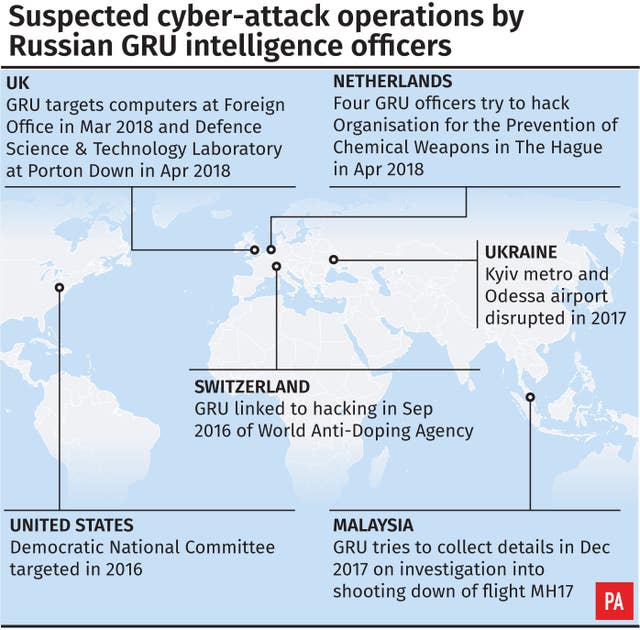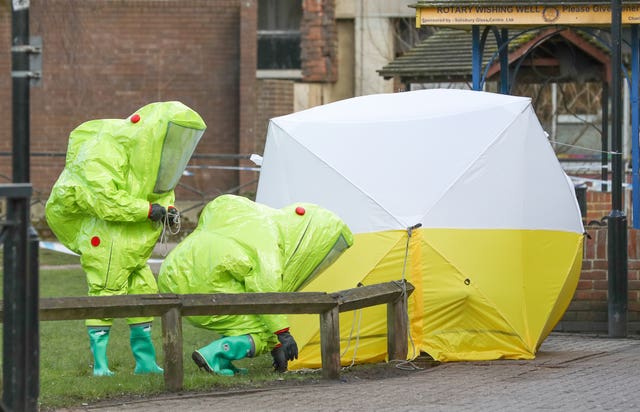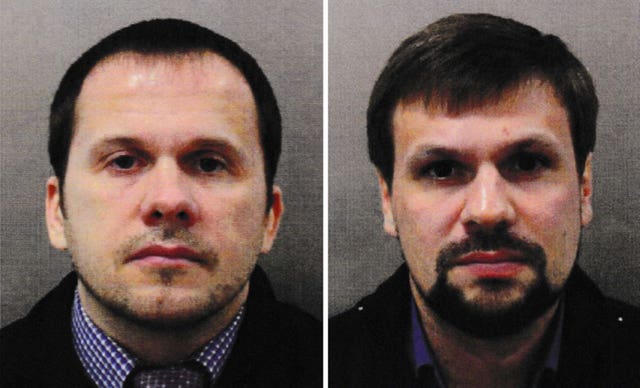
The head of Russian military intelligence, which stands accused over the fatal Salisbury Novichok attack, has died, the Kremlin has announced.
General Colonel Igor Korobov had suffered a “serious and long illness” and died on Wednesday, the Russian Defence Ministry told the state-backed Tass news agency.
The 63-year-old was hailed as a “true son of Russia” and had led the Main Directorate of the General Staff of the Russian Armed Forces – also known as the GRU – for several years.
The agency is believed to be Russia’s largest foreign intelligence outfit, with agents deployed all over the world, and is suspected of using cyber warfare and disinformation campaigns to achieve its goals.

Two officers from the agency are accused of travelling to the UK and attempting to assassinate Sergei Skripal, a former GRU colonel, in March.
“The leadership of the Defence Ministry of the Russian Federation, General Staff of the Armed Forces of the Russian Federation (GSA) and Main Directorate of the General Staff of the Armed Forces of the Russian Federation inform with great sadness that on 21 November 2018, after a serious and long illness, head of the (GRU), Deputy Chief of the GSA Colonel General Korobov Igor Valentinovich passed away at the age of 63,” a statement said.
“The memory of a wonderful person, a true son of Russia, a patriot of the Fatherland Colonel General Korobov Igor Valentinovich will forever remain in our hearts. We express condolences to his family and friends.”
Gen Korobov had worked in military intelligence since 1985 and was made chief of the GRU in 2016 by president Vladimir Putin.
The same year he was made the subject of US sanctions for “acts for or on behalf of the GRU”.
In October he was reported to have fallen ill after coming under heavy criticism for failings by the agency.
Michael Carpenter, a Russia adviser for Barack Obama’s administration, tweeted on Thursday: “His predecessor died in 2016 of a heart attack. Life expectancy for incumbents of this job is pretty low, but then so is the median life expectancy in Russia.”
The finger of blame was pointed squarely at the GRU following the poisoning of Mr Skripal and his daughter Yulia in March.

The botched assassination attempt led to the death of Dawn Sturgess, who, along with partner Charlie Rowley, fell ill after handling a container contaminated with the nerve agent in June.
In September Theresa May revealed that two Russian nationals had been identified as suspects over the attack.
British spy agencies concluded the men, who travelled to the UK under the aliases of Alexander Petrov and Ruslan Boshirov, were GRU officers.
The Prime Minister described the agency as a “highly disciplined organisation with a well-established chain of command”.
Following a widely-dismissed television denial, in which the pair claimed they were simply tourists visiting the cathedral city, their ‘real’ identities were revealed weeks later.

Investigative website Bellingcat said it had established Boshirov’s true identity, reporting he was actually Colonel Anatoliy Chepiga, a highly decorated officer in the GRU.
Bellingcat later said Petrov’s real identity was Alexander Mishkin, a military doctor in the GRU.
Both men had been awarded the Hero of the Russian Federation from Mr Putin, the investigators said.
The Bellingcat claims followed the president’s assertion that the men were civilians and had been discounted as members of his security network.
Mr Skripal was given refuge in the UK in 2010 after a “spy-swap” which saw 10 Russian sleeper agents expelled from the United States.
Accused of acting as a double agent after leaving the GRU in 1999, he was serving a 13-year prison sentence for allegedly working for MI6.
Russia has continuously denied attempting to kill him.


Comments: Our rules
We want our comments to be a lively and valuable part of our community - a place where readers can debate and engage with the most important local issues. The ability to comment on our stories is a privilege, not a right, however, and that privilege may be withdrawn if it is abused or misused.
Please report any comments that break our rules.
Read the rules hereComments are closed on this article